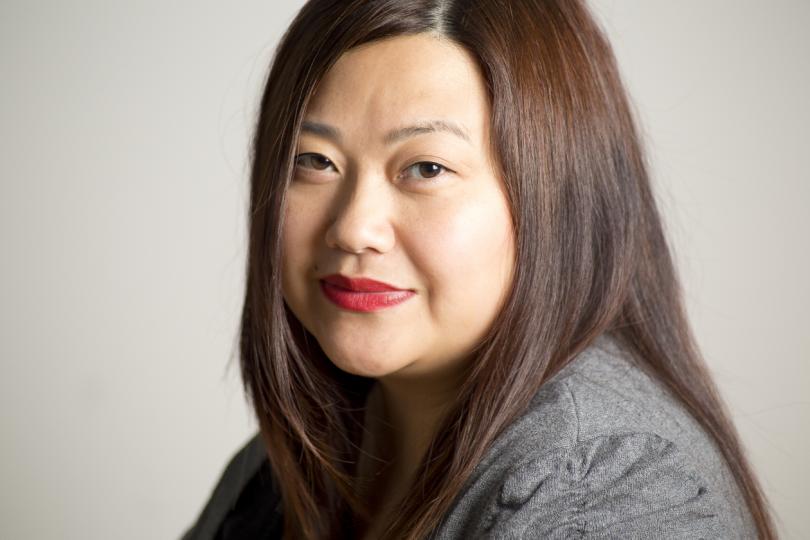Shape Up or Die with May Lee-Yang

Playwright, poet, prose writer and performance artist May Lee-Yang writes sassy and subversive work. Her latest script, The Korean Drama Addict's Guide to Losing Your Virginity, will be produced by Theater Mu this spring. We met at a coffee shop in St. Paul.
How did you come to the Twin Cities?
Well, in 1979, my family came here as refugees and we were sponsored into a small town south of the Twin Cities. The Lutherans brought us here. I've lived in St. Paul 95% of my life.
How did you come to playwriting?
By accident. I always knew I wanted to be a writer and I thought I would be writing prose. When I was 21, I accidentally came upon this call for the Many Voices Fellowship, which develops writers of color in the field of theater. I remember the application said that you could even submit poems and stories if you didn't have plays. So, I submitted poems and got accepted and that's what started it all.
I notice that in your work, you tend to make spaces for other people to make work. Can you talk a little about CALI organization and what you're working on there?
Creating space for me has been sort of accidental. A lot of times when people are producing my work, they don't know what to do with it. They need an audience: who's going to pay to come, and then if we give out free tickets who will come? So, I transitioned from just being a playwright to doing outreach, engagement, and marketing, because I wanted people at the table and in the seats.
I've been really lucky to have been around older artists who are very nurturing. They talked about opportunities that they had participated in and actually let me look at their grants, things like that. A couple years ago Mooks [Saymoukda Vongsay], Julia Nekessa Opoti, Desdamona, and I decided to go on a retreat to work on our own stuff, and it was really useful. But we're lucky, because we have relationships with each other and other artists. But what about folks who have no relationship to anyone? And so we started CALI - Community Artists Leadership Initiative to make some of the resources that already exist more transparent for folks. Some people don't know where to start, or that they are eligible for certain things, they don't know that some of the things they want to do are totally fundable.
What do you think keeps theaters from producing new work?
I think part of it might be audiences. I think they wonder how accessible my work is to folks who are not Hmong or not Asian, for example. I think that's definitely one part of it.
The other part of it may be that I'm not very good at hustling. Some people are great at building relationships and just going out there and saying: do you want to produce my work, do you want to produce my work? I create stuff and if people ask, do you want to do something? I'll say yes.
Part of it may be because I'm not reaching out to folks, so they don't know I exist. Or they might have specific ideas of what they think working with me means. It's not just producers, it's also audience members. I did a show called “Ten Reasons Why I'd Be a Bad Porn Star” years ago, and somebody came and watched it, and they were like, “I was really surprised” – this is a Hmong person – “this is not like a Hmong play at all.”
And I was like, “Were you expecting me to talk about the Mekong River of Tears?”
And they were like, “Yes, I was.”
There's this assumption for example, that if you're working with a Hmong writer, it won't be modern, it won't be edgy. Or if you are modern, you won't be accessible to elders. You're fighting against cultural norms. So I wonder if that's all a part of it?
And maybe another part of it is the simple fact that I'm a Minnesotan. It's not sexy. It's more sexy to produce plays from people who don't live here. When I left town and did a show and came back, people were like “Oh wow, if they hired you to go out there, you must be interesting!”
That's something I've heard from a lot of different playwrights. If you're here, then you're not going to be recognized. Locally grown is not as interesting as something done in New York four years ago. There are some theaters that do local work, and I want to make sure we laud them, Theater Mu for example who's doing your script in the spring.
I'm sure if you talk to Theater Mu they might have different answers, but one of the reasons why they started commissioning new work is because they realized, we need to create new works for the Asian American canon, and if we don't invest in that, it's not going to happen.
And also, I think one of the reasons why my work may be challenging is that it's a casting issue. It's Minnesota. If I want to write stories about Hmong people or Asian Americans or people of color, it can be challenging for companies to think about who they can hire.
What solutions have you found to that when your work is getting produced?
Giving people opportunities. Years ago, I ended up producing Confessions of a Lazy Hmong Woman, the Hmong language version. We auditioned people, but prior to the show rehearsals, we also had rehearsals where we built community and provided some acting coaching.
I think investing in actors and doing training gives people training wheels so they can go off and keep working. If they don't get a chance to perform on stage, they're never going to get where they want to be, or where we would like them to be. It's all about getting that first chance.
How did you get your first chance? And how do you give other people their first chances?
I got my first chance when I was 18. I opened this Hmong newspaper and there was an ad that said they were looking for actors. They were paying people, like, 250 bucks a week, and I thought that's a lot more than what I'm getting paid at Taco Bell. I have no acting experience, but sure, whatever. So I did the audition at the Playwrights' Center, and it was the first time I had ever been there. It was for Pom Siab Hmoob Theater. It was the first and possibly only Hmong Theater around. I was terrible, but the person who auditioned me, Nkauj'lis Lyfoung, hired me.
As a teaching artist, I've had a chance to also create space for people. I've learned that it's not that some people are not artists, it's that they haven't been given the opportunity to create. So, every single time I go into any sort of teaching artist situation, I facilitate opportunities for people to create. Sometimes people realize it's hard and it's not for them, but a lot of the time, I've found that people are amazing storytellers or amazing performers. They realize that the idea of telling their own story is completely healing, or they feel really good about learning other folks' stories. I feel really fortunate to have been in those kind of spaces. I realize I wasn't given a lot of opportunities growing up, and so I know that in some way, me helping other people is my own selfish thing of, man it sucked when I was growing up. I'm going to give you an opportunity that I wish I had been given.
What has telling stories meant to you?
When I was a kid it meant escapism. It was a way to get through life. I grew up in St. Paul in the 90s, My family was afraid we were going to end up in gangs, so I was stuck at home. And because I was stuck, I ended up reading a lot of books, which was my opportunity to explore new worlds. I still find a lot of value in escapism because life is hard.
The older I've gotten, the more I've thought about storytelling as a form of power. Who gets to tell what story? Bell hooks wrote about the move from silence to speech for the oppressed, and moving from an object to a subject is incredibly powerful. Being Hmong American, when I was growing up, we were definitely objects. We didn't have voices. People liked to come collect our stories but they didn't make opportunities for us to tell our own stories.
People like to study us, anthropologists, all those types. So the idea that I have the capacity to tell my own story in my own words is not something I take for granted. A couple years ago, I was doing a show, and afterwards this woman Facebooked me and she just said, “Hey, great show. By the way, I have a story I want to share,” and she wrote a long email about her story and combating domestic violence, and at the end she said, “it would be great for you to turn this into something, I'm going to give this to you.” It's happened a lot over the years. At first, it was kind of cool. But I don't want to be another anthropologist who steals your stuff. That's changed the way I do my work as a teaching artist. it's facilitating opportunities for people.
What do you think is the future of playwriting?
I don't know. I live in other artistic worlds, and fiction seems really hot. Young people are reading like crazy and writing new stuff, so I feel like books aren't going to die, at least not anytime soon. TV is hot, Netflix, all these different platforms, they've become such great forms for telling stories. But theater...
For a while now, theater companies have been concerned because their audience has been typically older white people and now that that audience is sort of literally dying off or changing, people have been worried about who is going to see theater. I actually feel hopeful. Years ago when I started out, people said to me, “Hmong people don't go see theater.” And so, of course, I was angry, and I was like, fuck it, I'm going to do it on my own, and people came and I have audiences. I realized, actually they do come see theater. Things have changed economically and educationally, it's been like 40 years. Hmong people have buying power. They will come see stuff, but we need to do a better job of letting them know that things exist, and we need to create work that they want to see. People have been having conversations about representation for a while now. I think theater companies need to shape up or they'll die, to be perfectly honest.
I already know, at least in this town, that Hmong people will sell out my houses. So that's great, but I would like to have other folks interested in my work. For example, I say to people, I will go see shows at the Guthrie, do I need to have a relationship with them? No. I have no relationship with Romeo and Juliet. I'm interested in a show, it doesn't matter that we have several hundred years of difference.
Even within the context of Asian American theater, if a show sounds interesting, I will go see it, even if it's a story about a Filipino family. It doesn't even occur to me to say, that's a Filipino play, I shouldn't go to that, or that's a black play, I shouldn't go see that. It doesn't even occur to me. So, what I find fascinating is that sometimes people look at my work and say, I'm not sure if I should go because 1, I don't know if I'll understand things, or 2, I don't want to offend “your people”, I want to create space for you guys. And I'm like whaaat? Just, just...
Just come give me your money!
Yeah, give me your money! (laugh) So I wonder if part of that has to do with how I'm marketing myself. I don't know, I need to think about that.
I feel like that's the narrative, though that plays out in bigger theater companies, too. Like, we have our “traditional” season, then we have our “specialty” plays that go to this audience. I feel like specifically ethnic plays are seen as “specialty.”
Sadly, I feel like this is applicable to national Asian American theaters as well. For example, Chinese, Japanese, Koreans, and even Filipino stories are mainstream. A lot of us Southeast Asians—Hmong, Lao, Cambodians—are still considered "exotic Asians", and I'd like to see us "more mysterious" Asian stories produced on a regular basis.
Do you have a metaphor you use when you talk about writing a play?
I have a metaphor for my relationship with plays and writing. I feel like literature is my first love, and drama is like the hot guy who's taking me out. So, every time literature calls me back, I go back. But I'm in grad school right now, and I need to find out are we going to get married or not? If not, someone's waiting for me, I gotta go.
I never really lived fully in the theater world because part of my energy is focused on my literature or producing work or teaching. So I'm like, we need to focus. Work on the book, try to give it a chance, or work on the plays and try to make it work. So that's sort of my relationship with both. Grad school is my last ditch effort to deal with literature, to actually commit and see if this is going to work. Maybe we've just been having a long distance relationship.
Plus, that hot guy is still calling you.
Yeah, he's still calling me. And I'm going to commit for the next three years, but I'm still picking up his calls. So...
Looking at the Twin Cities Theater community, what's the best way for them to take care of a local playwright?
Maybe doing what Theater Mu has done with me me, which is commission work and help nurture that piece of work and come back to that artist. Mixed Blood Theater did something that I thought was really cool, that every theater should do. They commissioned Aditi Brennan Kapil's work, and then they did a three city release.
The idea of the rolling premiere is great. You're building a relationship with the other companies, and the other communities are getting introduced to your work. A lot of these artistic directors have relationships with other companies that we don't have access to. I've talked to an artistic director somewhere before who said, I didn't know so-and-so, but this person vouched for them, so I'll give them a try. To me, that's simple. That's one thing that companies could do more of, not just produce work and nurture it, keep relationships with playwrights, but also introduce them to your friends. Minnesota people are very welcoming, we bring in people nationally. Now it's your time to call out favors, and say, Hey New York, Hey Seattle, Hey LA, Hey Iowa, you should look at this piece.
Why should theaters produce new work?
If nothing else, to survive and be relevant. The world has changed so much and if we do not create work that is interesting or relevant, why should audiences come? And why should writers like myself stay in this realm? I could be pitching a show to Netflix or HBO. But I think there is something really amazing about theater, the idea that you are in this same space together. You as a playwright can sit in the audience and watch as people connect to your work. You can use art to talk about the hard stuff. I've been wanting to do work around domestic violence and if I could do what I want to do, people could leave impacted, whether they are angry or traumatized or just learned a lot. I don't think I'd have the power to do with a TV show.




